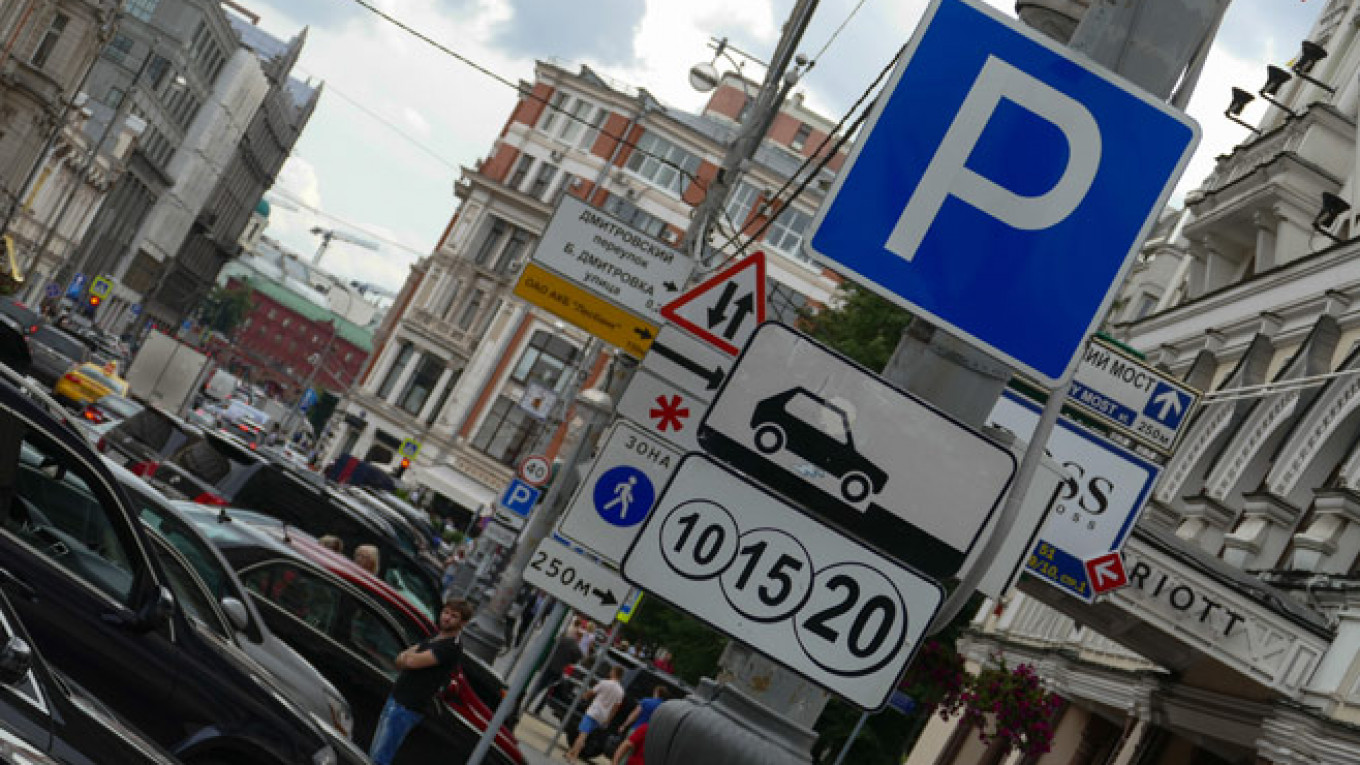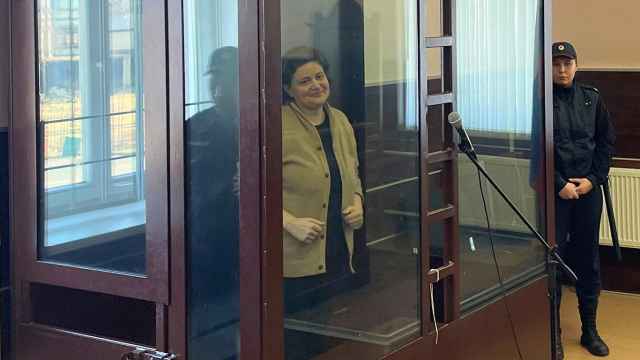The paid parking zones and green tow trucks that have become part of the Russian capital’s landscape in the last three years have cost Muscovites more than a few gray hairs.
For months drivers and experts couldn’t agree on whether the increased fines, constant threat of cars being towed away and the slow but sure expansion of the paid zone was a blessing in disguise or simply a curse.
This month the Moscow authorities announced another round of expansion. From Oct. 10, paid parking will be implemented on 95 streets “in places most attractive for drivers,” according to a statement on the website of the city’s transport department.
The list of places includes business centers, malls, metro and railway stations and markets. City officials promise that paid parking will not be introduced on the territory of residential buildings, such as in their courtyards.
At the same time, life is about to get more difficult for drivers who park their cars at residential buildings in order to avoid paying for parking: On Friday, Moscow Mayor Sergei Sobyanin said City Hall would help residents fund the installation of barriers at the entrance to the courtyards of apartment buildings, the RBC news agency reported.
This measure, according to Sobyanin, will stop drivers from flooding the yards and leaving no space for residents of those buildings to park their cars.
First Steps
The parking saga began in November 2012, when Sobyanin announced the introduction of a paid parking zone in the city center.
Residents welcomed the decision with little enthusiasm, saying it would be too expensive for them, RBC reported in December 2012.
Parking fees were set at 50 rubles per hour ($1.70 at the time, 90 cents now), meaning it would cost people who lived in the paid parking zone about 18,000 rubles ($600 at the time, $321 now) a month if they stayed at home during the day, even with free parking from 8 p.m. till 8 a.m.
Some residents organized a protest group that started sandbagging City Hall with angry letters and demands to put a stop to the project.
Muscovites living outside the city center were not pleased either. For several months there were only two ways to pay for parking: either by buying a card that was only sold in some mobile phone shops, or via an SMS service, according to the Gazeta.ru news website.
But the cards were hard to find, and drivers complained that the SMS service didn’t function properly for a long time.
“If I have to pay for parking, fine, I will pay for it, but usually I go to the center of Moscow on business and don’t have time to look for this card,” local resident Maxim Svetov told The Moscow Times. “I tried the SMS service three times back then, and for the first few months it just didn’t work,” he said.
A month after the project was launched, the city authorities acknowledged it needed to be adjusted to meet residents’ needs.
Sobyanin promised to lighten the burden on people living in the center by introducing residents’ permits.
Under the permit system, those who own real estate in the paid parking zone were able to pay a flat annual rate of 3,000 rubles ($100 at the time, $53 now). The move silenced most of the protesters and appeared to have pacified most residents.
Later, paid parking was expanded and a graduated pricing system introduced. It now costs 80 rubles ($1.40) per hour to park inside the Boulevard Ring, 60 rubles ($1.10) per hour within the Garden Ring and 40 rubles (70 cents) per hour within the Third Ring Road that encircles the city. On Sundays and public holidays parking is now free.
Later, paid parking was expanded and a graduated pricing system introduced. It now costs 80 rubles ($1.40) for the first hour and 130 rubles ($2) for every additional hour to park inside the Boulevard Ring and the Moscow City business district, 60 rubles ($1.10) per hour within the Garden Ring and 40 rubles (70 cents) per hour within the Third Ring Road. On Sundays and public holidays parking is now free.
Dodging the Fine
Those who fail to pay for parking face a fine of 2,500 rubles ($44), but the introduction of the system has sparked an impressively resourceful reaction among those determined not to cough up.
Specialized vehicles patrol Moscow’s streets, photographing the license plates of vehicles parked illegally. In attempts to avoid being detected, drivers started covering part or all of their license plates with bits of paper, plastic, CDs and a weird and wonderful variety of any other items at hand. Vehicles with plates denoting them as belonging to city officials are no exception and can frequently be seen with doctored plates.
This way, drivers explain, they don’t have to pay for parking or pay the fine.
“I don’t see why I should pay for parking if government officials don’t have to,” Ada, a Muscovite who asked for her last name to be withheld and who admitted to covering up her license plate every now and then, told The Moscow Times.
“I’ve seen it for so many times: State Duma deputies’ cars parked in the center with their license plates covered. It’s so hypocritical,” she said.
Expanded Version
Three years after the project was launched, most drivers have come to accept the system of paid parking in the city center.
The SMS service now functions properly, and it’s also possible to pay via an app available on phones that use both iOS and Android platforms, as well as by several other means.
In December last year, paid parking was expanded up to the Third Ring Road, this time eliciting dismay among those who work in the many offices within that area.
“At first I thought 40 rubles (less than $1) per hour wasn’t much, but then I did the math,” Mikhail Korolyov, who works in one of the office buildings inside the Third Ring Road, told The Moscow Times.
“I spend nine hours a day at work five days a week, which means I have to pay 9,000 rubles ($160) a month for parking. And there are no discounts for me [like the residents’ permits] because I am not a resident of the neighborhood,” he said.
Paid parking has become a lucrative business for City Hall: according to The Village news website, in 2014 alone, the authorities collected 1.186 billion rubles (about $20 million) in parking fees.
“All the money is distributed between local self-government institutions within districts where paid parking is in place. They spend it on maintenance work on residential buildings, roads and courtyards,” Sobyanin told The Village in July.
“That’s great, but we ordinary people can’t check whether it’s true or not. No reports are published about how much money they really earned and what they spent it on,” said city resident Svetov.
In 2014, the RBC news agency revealed the results of its investigation into paid parking in Moscow. It showed, among other things, very little financial transparency.
“It’s unclear where the payments go and how,” RBC quoted a former member of Moscow’s department of transport and road infrastructure development as saying.
“No one knows how much money made it to the budget. Moscow Paid Parking Administration [the state organization that manages the paid parking system] has never checked with the Federal Treasury,” he said.
Beware of Crocodiles
In June, new rules governing car towing were adopted in order to cope with another side effect paid parking had caused: an uncontrolled boom in towing.
In addition to fines for illegal parking, the owners of towed cars are obliged to pay 3,000-7,000 rubles ($53-$125) for the towing procedure itself, making it profitable for tow companies to remove as many cars as possible.
With the increase in parking regulations, the green tow trucks dubbed “crocodiles” by Muscovites began using every opportunity to take away cars to the pound — in some cases, even when the driver was present.
In the most high-profile incident, in October 2014 Moscow resident Konstantin Altukhov spent nearly 24 hours in his car after it was put onto a tow truck, the Moskovsky Komsomolets newspaper reported.
He agreed to pay a fine for violating parking rules, but refused to pay 5,000 rubles ($89) for his car being towed away. Altukhov got into his car in protest and spent 22 hours there, demanding the vehicle’s release. The authorities eventually released his car but said they would take him to court.
Softer Rules
In June the rules that regulate car towing changed, making drivers’ lives a little easier.
According to the new rules published on the website of the Russian traffic police (GIBDD), a car can’t be towed away if the owner returns to the vehicle before the tow truck has started moving.
If the owner agrees to pay the fine for the violation and is willing to “undo the wrongdoing” — for example, by re-parking the car if it’s a parking rules violation — they will get their car back and will not have to pay for towing.
Another change came into force in August, after which cars could only be towed away from spots where a sign is in place warning that tow trucks are operating in the area. The move reduced the number of places from where cars could be towed by 80 percent, the Kommersant newspaper reported in July.
Fines for parking in disabled spaces, on the other hand, were increased to 5,000 rubles ($89) under the new rules, and cars illegally parked in those spaces can be towed away at any time.
Contact the author at d.litvinova@imedia.ru
A Message from The Moscow Times:
Dear readers,
We are facing unprecedented challenges. Russia's Prosecutor General's Office has designated The Moscow Times as an "undesirable" organization, criminalizing our work and putting our staff at risk of prosecution. This follows our earlier unjust labeling as a "foreign agent."
These actions are direct attempts to silence independent journalism in Russia. The authorities claim our work "discredits the decisions of the Russian leadership." We see things differently: we strive to provide accurate, unbiased reporting on Russia.
We, the journalists of The Moscow Times, refuse to be silenced. But to continue our work, we need your help.
Your support, no matter how small, makes a world of difference. If you can, please support us monthly starting from just $2. It's quick to set up, and every contribution makes a significant impact.
By supporting The Moscow Times, you're defending open, independent journalism in the face of repression. Thank you for standing with us.
Remind me later.






